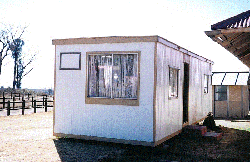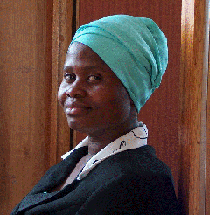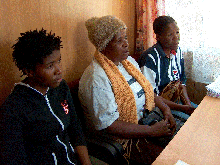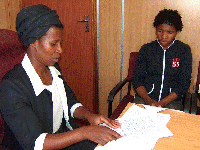 Coordinators: Nokuthula Mchunu and Patricia Maphanga. Nokuthula has worked for CCJ since 1998, and Patricia joined in 2000
Coordinators: Nokuthula Mchunu and Patricia Maphanga. Nokuthula has worked for CCJ since 1998, and Patricia joined in 2000
District: Sisonke Municipal District (the Midlands of KwaZulu-Natal)
Population: 107 558
Tel/Fax: 039 832 0194
Email: Bulwer.ccj@gmail.com
Areas served: Inkelabantwana, Inkumba, Ntabamakhaba, Charles, Ntokaneni, Mbhulelweni, Seeford, Nkwezela Nonguqa, Deepdale, St. Catherine, Kwabhidla, Betlehem, Siphahleni, Sopholile, Mnyamana, Sizanenjana and Sandanezwe.
Description: The rural town of Bulwer is in a farming area under the traditional leadership of Amakhosi and Izinduna. People find it easy to reach the centre because it is in the shopping district of the area. The infrastructure in surrounding communities is poor: roads are sometimes impassable after rain, and while areas around the town have electricity, sanitation is a problem. There are clinics, but they usually lack medical supplies.
In 2011 the support centre dealt with 393 cases, the most common being legal advice (185) and domestic violence (121).

Nokuthula Mchunu (Right) Bulwer Support Centre

How long have you worked for CCJ?
Since 1998
What led you to work for CCJ?
I heard about the CCJ when I was at the court and I have always wanted to help my community
What would you say is the biggest challenge facing people in your area?
It is domestic violence
Have you had a case when you relied on traditional customs?
Some clients used to want to pay or accept compensation for a crime, but we told them we don’t use those laws. They don’t try to use traditional methods anymore because they now know it’s against the law.
Would you say people's attitudes and behaviour are starting to change?
People have more respect for the office now. At first they thought I was trying to do things for my own sake. Now they realise that it’s about the law, it’s not about me.
“Some men have changed their attitudes – they treat women with more respect now." - Coordinator Patricia Maphanga |
Who is your role model?
There are two broadcasters on Ukhozi FM that I look up to. One of them is called Buthelezi. They give people advice and encourage them to face their problems and to deal with them positively.
Are there any laws that you would like to see changed?
Yes, in cases of inheritance, where an unmarried person dies without a will. The parents should inherit, not only the children, because they don’t use the money properly - for example they don’t use it for the parents’ funeral.
Can you describe one or two of the most satisfying cases you have dealt with?
There was a couple that were separated but not divorced. The husband’s family had taken back the lobola. When the husband died the wife didn’t know whether she could claim the husband’s work pension. I advised the wife that she could and helped her get it, and also helped arrange the sale of the husband’s house so that she received the money.
What are the main challenges you have in your work?
Transport is difficult because sometimes we can’t get to appointments on time. The police help us but they can’t always take us. We also need a photocopier, fax, and using the landline for making calls.
What advice would you give children growing up in Bulwer?
I would tell them not to get pregnant and to be careful of HIV/AIDS (Above) Coordinators Patricia and Nokuthula
Patricia Maphanga

How long have you worked for CCJ?
Since 2000
What led you to work for CCJ?
I have always been interested in helping my community and dealing with local problems.
What would you say is the biggest challenge facing people in your area?
“There was a man who was my enemy because I had assisted his wife to apply for a protection order and lay a charge of assault; he said he hated me, his wife and his mother. One day he stopped and he gave me a lift in his car. His wife was in the car with him and they were both happy to speak to me. They would not let me pay for the transport. They said that I do not have to pay because I help the community.” - Nokuthula Mchunu, June 2008 |
It is domestic violence
Have you had a case when you relied on traditional customs?
No, some clients want to pay or accept compensation for a crime, but we tell them that this is against the law.
Would you say people's attitudes and behaviour are starting to change?
Some men have changed their attitudes – they treat women with more respect now.
Who is your role model?
Winnie Kubayi, our boss. She has taught us how to live with people, to run our own work, to be leaders and not to rely on others.
(Left) Protection Order clients wait in Bulwer Support Centre
Are there any laws that would like to see changed?
In cases of underage sex, at the moment it is only the boy who gets punished. The girl should be too, because at the moment girls think they can go to their boyfriends and do whatever they like without consequences.
Can you describe one or two of the most satisfying cases you have dealt with?
There was a custody dispute over a child where two men claimed they were the father. There was the man living with the mother, who had appointed him as the father, and there was another man. I arranged for a paternity test and it showed that this other man was actually the biological father. I went to the court but they were not interested in helping us. I took the case to the tribal court and was called as a witness and the matter was settled – the biological father was given custody of the child.
Are there any particular challenges you have in your work?
We need help with transport and a photocopier, fax, and using the landline for making outgoing calls.
What advice would you give children growing up in Bulwer?
I would tell them not to rush and try to have things too early, like boyfriends and getting pregnant. I would advise them not to drop out in Standard 10, and to be careful of HIV/AIDS.
(Right) Patricia Maphanga attends to a client